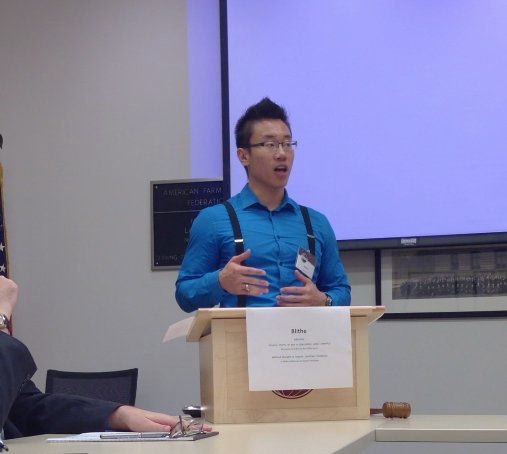I always thought Toastmasters was like one of those quaint support-group esque membership organizations, in the same category as Boy Scouts, Rotary clubs, and Alcoholics Anonymous. And indeed, some quick Googling reveals they were all founded in the early 1900’s.
I like public speaking, having done an Ignite talk and spoken at my high school graduation, but I think I could get a lot better. I’m particularly bad at off-the-cuff speaking – I tend to freeze up and sound neither natural nor professional. I remember once looking around for Toastmasters clubs when I lived in the Bay Area, but they were never very convenient to get to and it seemed like a big commitment.
In our Smithsonian new employee orientation they had a packet with all kinds of things, including an invitation to join the Smithsonian’s Toastmasters club. It happened to meet 2x a week right in my building on another floor during lunch so it would be super easy to get to. Given I’m only going to be around for six months, I figure I gotta make the most of all these “corporate perks” so I decided to join up.
Structure
I’ve been to four meetings and it’s been a great experience. The structure is pretty straight forward:
- The meeting starts at 12:05pm.
- The Sergeant in Arms calls the meeting to order.
- The Toastmaster of the Day introduces each of the three speakers to the podium.
- There’s a “table topics” session for impromptu statements (kind of like a Miss America on-the-spot Q&A)
- The General Evaluator introduces each of the three speech evaluators,
- There’s the report from the Time Keeper and the Ah/Um Grammarian
- Any final house keeping announcements are made.
- The meeting is adjourned at around 12:55.
It’s as much an exercise in good leadership and meeting management as it is about speaking since that’s a lot to squeeze into essentially 50 minutes.
Speaking
So far, I’ve given two talks.
There’s a sequence that Toastmasters wants you to follow and the first speech is “The Icebreaker“, a 4-6 minute speech designed to give the group a sense of who you are. The second is “Organize Your Speech“, a 5-7 minute talk that focuses on your ability to put your thoughts together in a coherent way.
My first talk was about three stories from my 16 years of gymnastics that show how the sport has shaped who I am today. The second speech was an extremely basic rundown of how websites get traffic (social, referral, search, advertising).
I’ve gotten to hear people speak about a variety of topics, from a touching story of their uncle’s big fishing trip, to how photography has changed the world, to proper way of riding a mountain bike.
Table Topics is also fun since they are only revealed at the meeting, and volunteers get to stand up and speak for at least a minute on the topic – which is sometimes pretty hard! Memorable topics include being asked to “sell” to the group something you grabbed out of a bag, for your opinion on whether or not less perfectly shaped fast food would sell better, and for a defense of “why blue is the best color in the universe”.
The People
There are about 15 or so people at each meeting, mostly folks from the various Smithsonian museums and archives, but also just other people who also work in the area. It’s weighted toward an older demographic but that might just mirror the Smithsonian itself.
The environment is totally supportive. Everyone claps when you take the “podium” and claps again when you finish. There’s always a standing ovation for your first speech. The Speech Evaluators are generally very positive too (in fact, sometimes I wish they gave more actionable feedback)
Still, there’s a bit of nerves when you give your speeches. Everyone is watching you and you are particularly trying to avoid saying “Um” or “Ah”. One phrase that a lot of people tend to use is “Sooo” as a way to start a sentence. You learn to catch yourself. Having someone tally all those up keeps you honest and while its a little painful to know exactly how many times to restarted you speech, I really think it helps you improve.
Overall, it’s been great meeting the folks at the meeting and I’m looking forward to continuing to develop my speaking skills.

